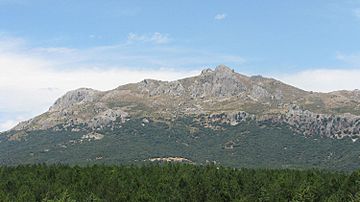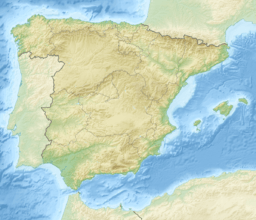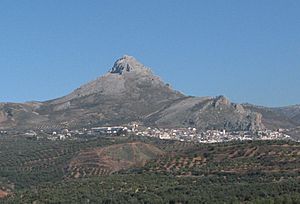Sierra de Cogollos facts for kids
Quick facts for kids Sierra de Cogollos |
|
|---|---|

View of the Sierra de Cogollos with its highest point, the Majalijar
|
|
| Highest point | |
| Peak | Peñón del Majalijar |
| Elevation | 1,889 m (6,198 ft) |
| Dimensions | |
| Length | 9 km (5.6 mi) NE/SW |
| Width | 2.5 km (1.6 mi) SE/NW |
| Geography | |
| Location | Granada Province, Andalusia |
| Country | Spain |
| Parent range | Subbaetic System |
| Geology | |
| Age of rock | Triassic and Jurassic |
| Mountain type | Limestone |
The Sierra de Cogollos is a mountain range found in Granada Province, Andalusia, Spain. It's part of a larger group of mountains called the Baetic System.
This mountain range is located northeast of the city of Granada. Its highest point is a peak called Peñón del Majalijar, which stands 1,889 meters (about 6,198 feet) tall.
Contents
Exploring the Sierra de Cogollos Mountains
The Sierra de Cogollos stretches between two areas: the Vega de Granada valley to the west and the Axarquía region in the east.
To the north, the narrow valley of the Blanco River separates it from the Sierra Arana mountains. To the south, another narrow valley, formed by the Bermejo River, marks its boundary with the smaller Sierra de la Yedra range. In its northeastern part, the Sierra de Cogollos connects with the Sierra Arana.
Key Peaks and Towns in the Range
This mountain range is home to the Peñón de la Mata. This is a limestone mountain with a huge rocky top that is 1,669 meters (about 5,476 feet) high. It stands tall over the town of Cogollos Vega. The highest peak, Peñón del Majalijar, is located at the other end of the range.
Most of the Sierra de Cogollos is within the area of Cogollos Vega. A small part of it also extends into Huétor Santillán on its eastern side.
Protected Natural Areas
The Sierra de Cogollos is part of a special protected area. This area is called the Sierra de Huétor and la Alfaguara Natural Park (Parque Natural de la Sierra de Huétor y la Alfaguara). It includes the Sierra de Cogollos along with nearby ranges like Sierra de la Alfaguara, Sierra de Huétor, Sierra de Diezma, Sierra de Beas, and the southern part of the Sierra de Arana. These parks help protect the natural environment.
How the Mountains Were Formed
Geologically, the Sierra de Cogollos is part of the Baetic System. It is mainly made up of sedimentary rocks. These rocks were formed a very long time ago, during the Triassic, Jurassic, and Cretaceous periods.
More to Discover
- Baetic System
- Geology of the Iberian Peninsula
 In Spanish: Sierra de Cogollos para niños
In Spanish: Sierra de Cogollos para niños



